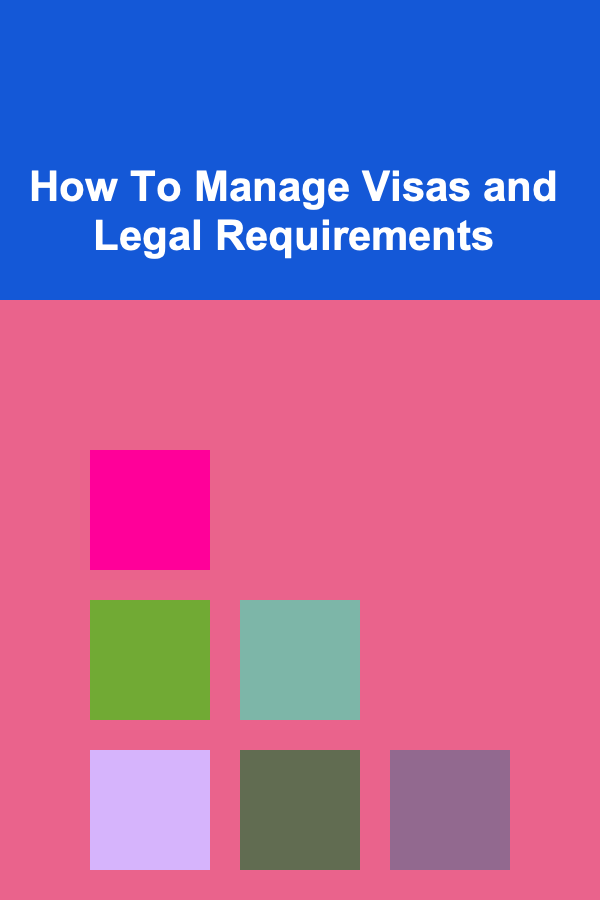
How To Manage Visas and Legal Requirements
ebook include PDF & Audio bundle (Micro Guide)
$12.99$6.99
Limited Time Offer! Order within the next:

Managing visas and legal requirements for international travel, study, work, or relocation is a complex and often stressful process. Whether you're a student, a professional, or someone seeking to explore new opportunities in another country, understanding the visa application process and the various legalities involved is essential. A successful visa application can pave the way for your international endeavors, but navigating the bureaucratic hurdles requires knowledge, patience, and attention to detail.
In this article, we'll break down the different types of visas, the requirements for obtaining them, and the strategies for managing the entire process efficiently. From ensuring that you meet the eligibility criteria to understanding the nuances of international law, this guide will help you manage visas and legal requirements effectively.
Understanding Different Types of Visas
Visas are essentially official documents that allow foreign nationals to enter, exit, or stay in a country for a specific purpose. The type of visa you need depends on the reason for your travel. While visa policies vary from country to country, they generally fall into the following categories:
1.1. Tourist Visas
A tourist visa is issued for the purpose of leisure travel. It is usually short-term and allows a visitor to stay in the country for a set period, typically ranging from 30 to 90 days. Tourist visas do not generally allow the visa holder to work or study in the host country.
1.2. Student Visas
Student visas are granted to individuals who are pursuing academic studies abroad. These visas often come with restrictions such as limited working hours or specific requirements for maintaining student status. To obtain a student visa, applicants typically need to provide proof of enrollment in a recognized educational institution, proof of financial support, and health insurance coverage.
1.3. Work Visas
Work visas are issued to individuals who intend to work in a foreign country for a specific employer. There are multiple types of work visas, depending on the nature of the work, the skills required, and the duration of stay. Common work visas include skilled worker visas, temporary worker visas, and intra-company transfer visas. Each country has its own set of requirements for these types of visas, which may involve offering proof of employment, meeting specific qualifications, and undergoing a background check.
1.4. Business Visas
Business visas are for individuals visiting a country for business purposes, such as meetings, conferences, or negotiations. These visas usually do not allow the holder to engage in long-term employment or receive compensation within the host country. However, business visitors may engage in activities related to their business dealings, such as attending industry events or meeting with clients.
1.5. Family Visas
Family visas allow individuals to join family members who are residing in a foreign country. These visas can be for spouses, children, parents, or other close relatives. Family reunification is a key component of immigration policies in many countries, but the application process may vary based on the country's regulations.
1.6. Immigrant Visas
Immigrant visas are for individuals who are seeking to live permanently in a foreign country. These visas may be granted based on various grounds, including family relationships, employment offers, or refugee status. Immigrant visas are often subject to a more rigorous application process, including health screenings, background checks, and sometimes interviews with immigration officials.
1.7. Transit Visas
Transit visas are short-term visas issued to travelers who are passing through a country on their way to another destination. These visas typically have strict time limitations and may require the traveler to stay in the transit area of the airport or within a specific region of the country.
Visa Application Process
Applying for a visa is an essential step in international travel, but it can be a complicated and lengthy procedure. The steps involved vary depending on the type of visa and the country's regulations. However, the general process includes the following steps:
2.1. Determine the Right Visa Type
Before applying, it's crucial to determine which visa type best suits your purpose of travel. The wrong visa can lead to delays, rejection, or complications during your stay in the destination country. Read through the eligibility criteria and requirements of different visa types, and ensure that you qualify for the one you wish to apply for.
2.2. Research the Application Requirements
Each country has specific application procedures and requirements for obtaining a visa. Begin by researching the official embassy or consulate website of the country you are applying to. Common documents required for most visa applications include:
- A valid passport
- Proof of sufficient financial resources
- Medical and/or travel insurance
- Proof of accommodation
- A return ticket
- Application fees
Some countries may also require additional documents like invitation letters, police clearance certificates, or language proficiency tests.
2.3. Complete the Application Form
Visa applications typically require filling out a detailed application form. These forms ask for personal details, travel history, and information about your background and reason for travel. Ensure that the information you provide is accurate and truthful. Any discrepancies or inaccuracies could lead to your application being delayed or denied.
2.4. Gather Supporting Documents
Along with the completed application form, you will need to submit several supporting documents to prove your eligibility. Depending on the visa type, you might need to include:
- Financial documents (bank statements, salary slips, tax returns)
- Educational or work credentials (letters of admission, job offer letters)
- Travel insurance details
- Photographs
- Travel itinerary
Organize and double-check your documents before submitting them to avoid delays or requests for additional information.
2.5. Attend an Interview (If Required)
Some visa applications, especially those for work, immigrant, or student visas, require an interview at the consulate or embassy. During the interview, you may be asked questions regarding your travel intentions, plans, and financial standing. Be prepared to provide clear and concise answers, and present any additional documents if requested.
2.6. Submit the Application and Pay Fees
After ensuring that your application is complete and all documents are in order, submit your application either in person at the consulate or embassy, or online through the designated application portal. Many countries also require an application fee, which may vary based on the visa type. Be sure to pay the fees promptly and keep a receipt for reference.
2.7. Wait for the Decision
After submitting your application, the visa processing time can vary depending on the country, the type of visa, and the volume of applications. Processing times can range from a few days to several weeks, so plan accordingly. Some countries offer expedited processing for an additional fee.
2.8. Receive Your Visa
If your visa application is approved, you will receive your visa either electronically or as a physical stamp or sticker in your passport. Review the visa details carefully to ensure that all information is correct, including the dates of validity and the type of visa issued.
Legal Considerations and Requirements
In addition to the visa application process, travelers must also be aware of the legal requirements of their destination country. These requirements can vary depending on the country's immigration laws, but there are several key aspects to consider:
3.1. Understanding Immigration Laws
Each country has its own immigration laws, which dictate who can enter, stay, and work within its borders. These laws govern everything from entry requirements to the length of stay, work permits, and residency rights. Familiarize yourself with the immigration policies of the country you are visiting to ensure compliance during your stay.
3.2. Adhering to Visa Conditions
Once you receive your visa, it's important to follow the conditions associated with it. For example, some visas have restrictions on the length of stay, type of employment, or where you can live within the country. Violating visa conditions can result in fines, deportation, or even a permanent ban from entering the country.
3.3. Work Permits and Employment Authorization
For individuals planning to work in a foreign country, it's essential to understand the work permit and employment authorization process. Some visas allow individuals to work while others do not. Ensure that your visa permits employment if that is your intention, and be aware of any restrictions on the type of work you can perform.
3.4. Health and Safety Regulations
Many countries require foreign nationals to undergo medical checks or vaccinations before entering the country. This is particularly common in countries with high health risks or during pandemics. Be sure to check the health requirements for your destination and make the necessary preparations before your trip.
3.5. Understanding Taxation Policies
If you're working abroad, you may need to understand how taxation works in the host country. Some countries tax foreign workers, while others have tax treaties to prevent double taxation. Ensure that you comply with both local and home-country tax laws to avoid legal complications.
Tips for Managing the Visa Process Efficiently
Managing visas and legal requirements can be overwhelming, but there are several strategies that can streamline the process:
4.1. Start Early
Visa applications can take time, and delays are common. Begin the process well in advance to give yourself enough time to gather documents, attend interviews, and wait for approvals.
4.2. Stay Organized
Create a checklist of all the required documents and deadlines to ensure that nothing is overlooked. Keep your application materials organized and easy to access.
4.3. Seek Professional Help
If you're unsure about the visa application process or face complex legal requirements, consider seeking the help of an immigration lawyer or consultant. They can guide you through the process and ensure that your application is accurate and complete.
4.4. Monitor Your Visa Status
After submitting your application, regularly check the status of your visa to ensure that there are no unexpected delays. Many countries provide online portals for applicants to track their visa status.
4.5. Prepare for Contingencies
In case your visa is denied or delayed, be prepared with backup plans. You might need to apply for a different visa or appeal the decision, so staying flexible and informed is crucial.
Conclusion
Managing visas and legal requirements is a crucial part of international travel and relocation. Whether you're traveling for work, study, or leisure, understanding the visa application process and staying compliant with legal requirements is essential for a smooth and successful experience. By carefully navigating the process, staying organized, and seeking professional advice when necessary, you can manage your visas and legal requirements effectively and avoid unnecessary stress.
Reading More From Our Other Websites
- [Home Space Saving 101] How to Master Maximizing Closet Space with Smart Organization Hacks
- [Personal Investment 101] How to Use Deep Learning to Build Scalable Passive Income Models
- [Organization Tip 101] How to Create a Kid-Friendly Snack Zone in the Kitchen
- [Beachcombing Tip 101] Essential Gear for Successful Beachcombing: A Comprehensive Buying Guide
- [Home Soundproofing 101] How to Use Acoustic Caulk and Sealant for a Quieter Home Environment
- [Home Pet Care 101] Understanding the Different Types of Cat Litter
- [Home Staging 101] How to Stage a Home for Millennial Buyers
- [Home Party Planning 101] How to Set Up a DIY Dessert Bar for Your Home Party
- [Home Maintenance 101] How to Protect Your Home's Flooring from Wear and Tear
- [Home Security 101] How to Use Home Security Apps to Keep Your Property Safe

How to Choose the Right Lighting for Each Room in Your Home
Read More
How to Organize Transportation for Guests and VIPs
Read More
How to Set Financial Goals for Your Family
Read More
Self-Care: Nurturing Yourself for a Healthy and Happy Life
Read More
How to Categorize Credit Card Fees for Better Financial Insights
Read More
10 Tips for Starting an Art Therapy Practice
Read MoreOther Products

How to Choose the Right Lighting for Each Room in Your Home
Read More
How to Organize Transportation for Guests and VIPs
Read More
How to Set Financial Goals for Your Family
Read More
Self-Care: Nurturing Yourself for a Healthy and Happy Life
Read More
How to Categorize Credit Card Fees for Better Financial Insights
Read More